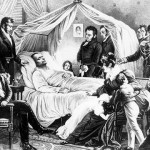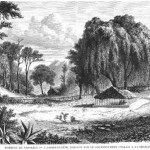His preparations for death were methodical and complete. During the last fortnight of April all his strength was spent in dictating to Montholon his last wishes. He even dictated, ten days before the end, the note which he wished sent to Sir Hudson Lowe to announce his
death. The articles he had in his possession at Longwood he had wrapped up and ticketed with the names of the persons to whom he wished to leave them.
His will remembered many of those whom he had loved or who had served him. Even the Chinese laborers then employed about the place were remembered. “Do not let them be forgotten. Let them have a few score of napoleons.”
The will included a final word on certain questions on which he felt posterity ought distinctly to understand his position. He died, he said, in the apostolical Roman religion. He declared that he had always been pleased with Marie Louise, whom he besought to watch over his son. To this son, whose name recurs repeatedly in the will, he gave a motto – All for the French people. He died prematurely, he said, assassinated by the
English oligarchy. The unfortunate results of the invasion of France he attributed to the treason of Marmont, Augereau, Talleyrand, and Lafayette. He defended the death of the Duc d’Enghien. “Under similar circumstances I should act in the same way.” This will is sufficient evidence that he died as he had lived, courageously and proudly, and inspired by a profound conviction of the justice of his own cause. In 1822 the French courts declared the will void.
They buried him in a valley beside a spring he loved, and though no monument but a willow marked the spot, perhaps no other grave in history is so well known. Certainly the
magnificent mausoleum which marks his present resting place in Paris has never touched the imagination and the heart as did the humble willow-shaded mound in St. Helena.


